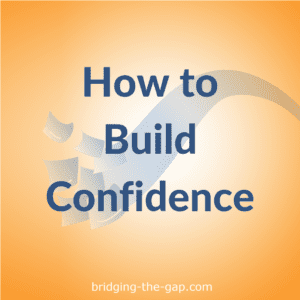Confidence is a belief – it is a belief in yourself and your ability to achieve a specific result in your life and your career.
In my work helping business analysts, I see a lot of lack of self-confidence. I see people underestimate their abilities all the time. Our analytical minds can have a field day with our self-belief. It’s so easy to pick our skills and abilities apart, which leads to self-doubt and inaction.
In our programs, the most common result people share with us is that they feel more confident. We’ve unlocked the code to building more confidence, and today I want to share that code with you.
For those who like to read instead of watch, here’s the full text of the video:
Hi, I’m Laura Brandenburg from Bridging the Gap and we help business analysts start their careers.
Today, I want to talk about a big challenge that I see in our profession and that is confidence. Confidence is a belief. It’s a belief in yourself and your ability to do what you need to do to be successful in your role. In our work training the next generation of business analysts, one of the most common results we have people express when going through our programs is that they feel more confident. I feel like we’ve unlocked the code of what it takes for an analytical professional to truly feel confident in their skills and abilities. Today, I want to share that code with you.
Building Confidence #1: Get Clear On Your Purpose
The first thing is to get clear on your purpose. In all of our programs we ask, “Why are you here? What are you hoping to accomplish? What about this is important to you?” We want to start to see yourself in the future, want to see yourself doing something more, and you want to link whatever it is you’re doing today to the big picture of where you’re going in your life and your career.
You might not have your big picture figured out yet, next step is okay. Where I want to be three months from now is okay. Where I want to be at the end of the year is okay. We can get overwhelmed with purpose. What does the next thing look like for me and why is that important to me? We need some fuel to do the work of building and cultivating confidence, and so that purpose gives us the fuel.
Building Confidence #2: Learn from a Trusted Resource
Second is to learn from a trusted resource. What I see is people reading dozens of different resources and trying to put all the pieces together and get overwhelmed with information and end up in analysis paralysis. Do your research. I don’t want to encourage people not to research. Sometimes, when a resource resonates with you and the results that they have resonate with you are what you want aligned with your purpose, it’s okay to say, “This is where I’m going. I’m going to trust this resource.”
Sometimes it’s trusting yourself.
Building Confidence #3: Take Action Before You Are Ready
Then you want to take action. What we do in our programs is not just consume information. That’s part of the learning process. But the confidence comes not from consuming information.
The confidence comes when people take action.
Taking action before they feel ready. You’re never going to feel ready, you’re never going to feel you take the action. It’s a little bit of the chicken and the egg, and I’m going to tell you, all you’ve got to do is just start taking the action. Take the action, do the deliverable, do the work, put your feet into the water. Start practicing the new behaviors that you want to be doing that are aligned to that goal that you have.
Building Confidence #4: Receive Feedback (From the Right People)
Ideally, you want to be in an environment where you can receive feedback from the right people. Your stakeholders are not always the right people. They have their own agendas. They don’t know what a good requirement looks like or a good process looks like. They could say this looks great, when it doesn’t. They could say this is hard for me to understand when you’ve followed every rule in the book.
Your stakeholders are often not the best people to receive feedback from, and your manager may or may not be. Some managers grew up as business analysts, and so they get it. Others don’t. They’re just as unfamiliar with the profession and what good requirements look like as you might be. They might not be the best person to provide feedback to you either.
Look, again, for feedback from somebody who really does understand what it takes to be successful as a business analyst. That person could be inside your company, a senior mentor, could be somebody you meet at a local meeting, it could be hiring a coach or a mentor, an instructor. But find somebody that you can get feedback from because that’s where once you take the action and receive that feedback, that’s where we see the confidence come from. That’s an important part of the code.
You want to build that feedback from an authoritative resource who can give constructive feedback, not just, “Oh, that’s horrible.” That doesn’t help you. That’s not going to build up your confidence. But here’s what you did right, here’s where you can improve, and here is where you need to make some updates. That gives you, like, “Oh, now I can be confident in what I did right, and now I can take new action to improve on what I didn’t do right.” That’s the kind of feedback you’re looking for.
Building Confidence #5: Celebrate the Small Wins
As you do that, you want to celebrate the small wins. It’s easy to be like, “Okay, great. I did a new thing,” and move on.
Success creates more success. Confidence creates more confidence.
I do things today that were, literally, unimaginable to me a year ago, two years ago. It’s because I’m continually taking new action, continually receiving that feedback and celebrating every win along the way and acknowledging, “Look, I did that. Now I can do this next thing that also feels a little scary.” Confidence just keeps coming from taking those actions.
Building Confidence Tip #6: Take Responsibility for Mistakes
Finally, when you do make a mistake, which is inevitable. We all make mistakes. It happens all the time. What I see is people worry so much about making a mistake that they don’t take action, they never get to that confidence. What I want you to do is realize you’re going to make a mistake and it’s okay. Often, we can recover from these mistakes. More often than not, we can recover. But be prepared to just take responsibility for it. Apologize, if that’s appropriate in the situation, take responsibility, and fix it. Take ownership of it.
As soon as you start to blame the stakeholder or the company or this, your failure and success is dependent on all these outside circumstances which doesn’t enable you to create an environment in which you can be successful. When you take responsibility for your successes by celebrating your wins and your failures by taking ownership of your mistakes, then you can always be confident in any situation. You can start to have that true inner confidence that makes it okay, even if you make a mistake.
What I really want you to take away from this video is that confidence is not something that somebody else can give to you.
Confidence is something that you give to yourself and it’s the greatest gift that you can give to yourself, to be able to take action in confidence, or even to just know that the actions you’re taking, even if they feel scary, are going to give you confidence in the end. This is a gift you give yourself. There’s no one else on earth who can give this to you.
I hope that this helps you take a step forward to find more confidence in yourself. The world needs more business analysts like you doing great work, taking risks every day, speaking up in meetings, making sure that companies are thinking through the real problems that need to be solved, and working on the best possible projects. We need us as a profession and individually to all be taking that next step in more confidence.
Again, my name is Laura Brandenburg at Bridging the Gap. We help business analysts start their careers.
>>Looking for More Support?

Click here to learn more about the Effective Conversations Template Collection

